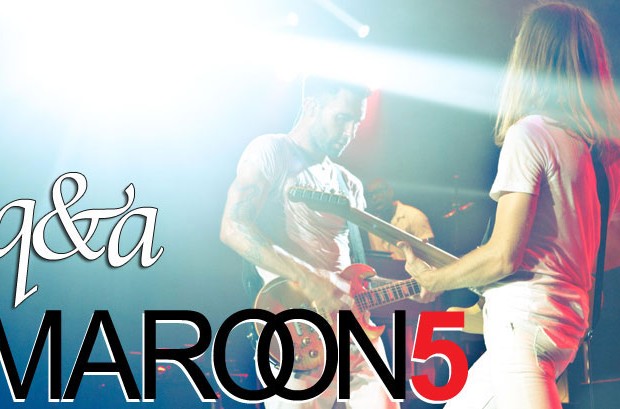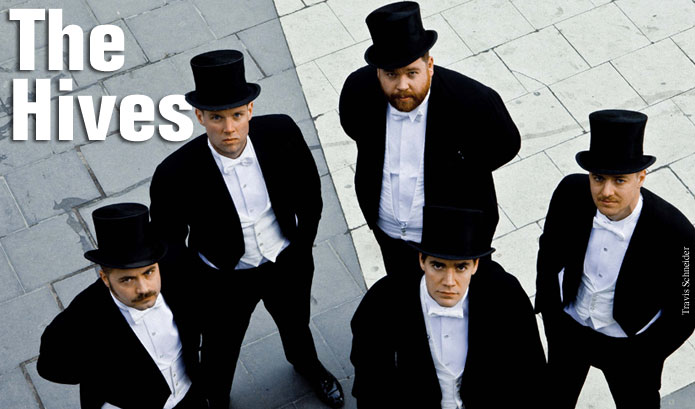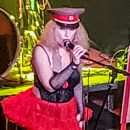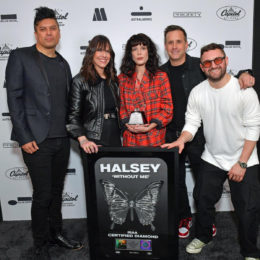By Dan Kimpel
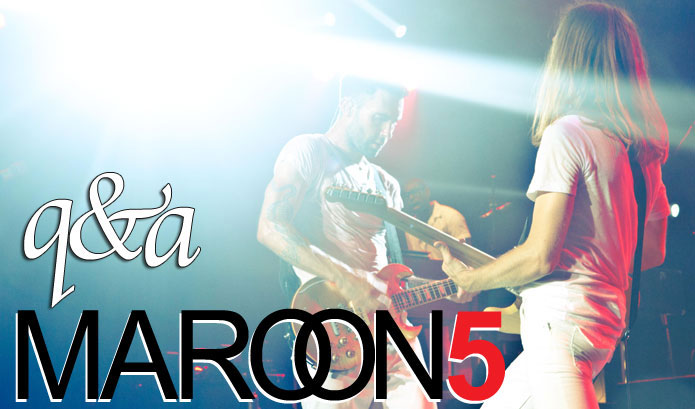
It would be easy to attribute Maroon 5’s renewed eminence to Adam Levine’s presence as a judge on the breakout television hit The Voice. But simply celebrating a lithesome frontman with a penchant for displaying his tattooed body and sparring with a testy diva on a television show is a disservice to an ever-evolving band that is flourishing long after lesser groups would have been knocked out of the ring.
Two key members––self-effacing lead guitarist James Valentine and the animated and hypercharged Adam Levine––reveal a contrast in energies. In this exclusive interview, MC speaks with the pair about the shifting colors of one of the world’s most successful bands.
Music Connection: On your previous records, the band gathered songs and then recorded them within a concentrated time period. How was the conception and recording of Overex-posed a different process?
James Valentine: This album was, “Instead of sitting around for months talking about what we want to do, let’s go fucking do it.” We started going into the studio before we were even done touring the last record.
MC: What is it like envisioning an entire album within the context of what’s become an increasingly singles-oriented world?
Adam Levine: It’s hard to explain. I think the band has always been interested in making good records and it’s been about quality. We’re not concerned with just making a [single]; we want all the songs to be great. We can’t get too far inside––these are pop songs––but these are the best songs that are right for the record. When you think about it, it’s a shot in the dark making any album. Where you are creatively is what your record reflects.
MC: Overexposed is executive produced by Swedish wunderkind Max Martin, and illuminates a sleeker strain of modern pop. Since the sound of the record is ultra contemporary, would you agree it fits the pop playlists of modern radio?
Levine: I don’t pay attention to the radio. That’s the worst thing to do, to write for the radio. I’d rather think what the radio is going to sound like tomorrow. We’re not in the business of cashing in with pop hits. You have to feel something when you hear it––I’m not interested in fluff.
MC: James, did “Stereo Hearts,” Adam’s guest spot with Gym Class Heroes, and the band’s subsequent “Moves Like Jagger” with Christina Aguilera, inspire the decision to work with out-side songwriters?
Valentine: Yes. That session sparked the idea that we don’t have to spend a whole year making a record in one place with one guy, so we decided to start collecting songs. We set up camp at Conway Recording in Los Angeles and had different guys coming in and out. We were with them for a good chunk, even though there was some emailing of songs back and forth.
MC: Adam, what was the collaborative chem-istry with this slate of writers and how did the process evolve?
Levine: Songwriting wise, it is our strongest al-bum ever, because we had so many amazing songwriters helping us out. I wanted to take what we do and apply it to what they do. I don’t think there’s ever been an experience like that for any of the parties. It felt new, it felt fresh and it felt different. It didn’t feel like it was being plugged into a formula. I think it yielded some cool tunes. I’m so happy with the record.
MC: Adam, what’s your strength as a writer?
Levine: I’m not the kind of guy who can write out- of-the-park smashes, but I’ve got my moments with melody. I think my strong point as a writer is lyrics. They’re super important to me––every word that’s said and how it’s said.
MC: How has your writing evolved?
Levine: I’m learning to write now. I never knew what I was doing. All of my songs were mistakes. I wrote with the band or Sam Farrar (Phantom Planet). All of a sudden I was songwriter because the record succeeded, but being a hit writer was never part of my agenda. I’m learning the tricks of the trade now.
MC: Such as?
Levine: In my narrow view a good pop song isn’t shrouded in poetry––it’s very matter of fact in a hooky way. There’s no mystery and it’s a bold statement.
MC: Do you use your voice as an instrument when writing?
Levine: I think that’s how I write melodies, me singing melody different ways. Inflection and tone are all part of being able to sell a melody or a lyric ––it’s a tool that I use. Selling the song is a huge part of it. My collaborator Ammar Malik paid me a wonderful compliment. He said, “Everything you sing sounds like a hit.” Not true, but sweet.
MC: Are you a journal guy? A track guy? What tools help you?
Levine: Most melodies and lyrical ideas I write on my iPhone. The best thing I have is the voice memo on restless, sleepless nights. That’s it. It’s a pure and easy way to do it because I’m lazy.
MC: The Voice has been an undeniable platform for Adam and, since the single “Payphone” debuted on the show with 493,000 digital downloads after the band’s performance, clearly for Maroon 5 as well.
Valentine: The band has opened up to a com-pletely new audience. That show ended up doing more for the band in terms of exposure than any-thing we’ve ever done. It’s been incredible.
Levine: I wasn’t sure I could have predicted this outcome. We did the show for numerous reasons, but one was that it would help the band out—but we didn’t know how much it’d help the band out.
MC: How did Wiz Khalifa impact the single “Payphone” with his guest spot?
Valentine: [Songwriter-producer] Benny Blanco had just done some work with him and thought he’d be perfect for the track. Wiz came in and he killed it. Champagne was popping after every verse was done.
Levine: Wiz is cool as shit and I loved working with him. I got to hang with him. Even though he’s really huge it’s just the beginning for that guy. A lot of collaborations seem forced or stale, or it’s a go-to person, but this one’s really cool.
MC: What did Max Martin bring to the project as the executive producer of Overexposed?
Valentine: When you’re working with so many different types of people it’s good for someone to be at the helm to make sure that it all works together in some cohesive manner. Max was great for that. His instincts are awesome. He hears a track and instantly has a couple of little tweaks that make a big difference.
Levine: Max is a master of so many aspects of making music, and one of the few guys I’ve ever worked with who just has no ego. Mutt Lange was similar––the best idea wins. He’s not about credit; he’s about doing the right thing for the song. The other writers respect him and he comes from a really humble place.
MC: Songwriter-producers Shellback, Benny Blanco, Ryan Tedder, Ammar Malik and Robo-pop are all over the record as co-writers. What is the creative chemistry with these collaborators?
Levine: Working with Ryan, we were kindred spirits in the studio. There is this crazy, frantic, rambling, gnarly energy. We wrote three or four songs in five days and were fearlessly prolific, which is a cool method. When I wrote with Amar we smoked the hookah and chilled and in three hours we had it. This record is great because every process and every creative venue was explored.
MC: James, you recently were a guest speaker at Musicians Institute (MI) in Hollywood. Did you ever study music formally?
Valentine: I wanted to go to Berklee or MI, but I was stuck back in Nebraska. Just being in the environment to focus on woodshedding at that point in your life is really useful. And certain things I wanted to work on over the years, purely from a technical standpoint, would have been sped up if I would have had that concentrated period of time just to sit in one of those practice rooms with someone like Jude Gold from Musicians Institute looking over me.
MC: What did you tell the students about the shrinking role of guitar in pop music?
Valentine: It’s not really good news for the guitar in modern pop music. I would love to be involved with the next evolution of what the guitar does and its role in music. I’ve been experimenting with MIDI guitar and controlling certain frequency responses with controller built into the guitar. It can go a lot of different directions, but there haven’t been a lot of innovations and the sound of pop music right now doesn’t have to do with guitar, which is sad for guitarists, but maybe it’s a nice challenge to figure out how to work it in.
MC: “One More Night” from Overexposed in-corporates a skanking guitar line. How does reggae fit into the Maroon 5 sonic panorama?
Valentine: I really like that track because it’s got the reggae vibe juxtaposed against a very cont-emporary sounding beat to create something that sounds new to me.
Levine: I listen to old reggae in the morning. It immediately lifts and changes everything about the day before it starts. It’s the best medicine––it’s California, it’s sunny, you’re waking up and before you take a shower you’re happy.
MC: Adam, your voice is an instrument that can cut through a dense mix, but it seems like maintaining space around it is equally important to the Maroon 5 dynamic.
Levine: I am so anal when It comes to air; it’s not about how produced something is, it’s about what goes on between the lines of production. My favorite stuff is “how is this only three things?” Or the opposite, “Let’s take 400 things and make it sound like one thing.” The less subdivision you do in music the better, a massive idea that pulses with the same dynamic.
MC: What would you use as an example of this?
Levine: Hip-hop records from the mid-late ‘90s and also the Fugees. Between the members of that band they made the best records of that era including The Carnival (Wyclef Jean) and The Miseducation of Lauryn Hill. For me these are the most soulful records of that era. They’re programmed but they sound contemporary today.
MC: Do you think Maroon 5 has that same time-less dimension?
Levine: “She Will Be Loved” does sound like it could have come out today. We’ve always gone with a basic stripped down approach, and it never gets old.
MC: You are both very gracious with your time and energy for this interview. We have to ask: do you enjoy this process or is it a chore?
Valentine: Sometimes. Look, we’re having a love-ly chat here, I’m sitting with my coffee and it’s fun. I forgot about what we did last week when it was these all-day press junkets where you have to sit in the same room and people come in from 10:30 a.m. until 8:30 at night asking the same questions over and over again. It is not my favorite part of the job. I’m not complaining, and I’m grateful people want to hear me talk endlessly about Adam and these things. But doing it all day can be very soul sucking.
MC: James, tell us about JJamz, your side-pro-ject with Jason Boesel of Rilo Kiley and Bright Eyes, Alex Greenwald of Phantom Planet, Z Berg of the Like and solo artist Michael Runion. Why are you performing in modest venues like The Detroit Bar in Anaheim and the Bootleg Theatre in Los Angeles? Is this a way for a huge rock star to reconnect with the people?
Valentine: (Laughs) You could frame it that way. Basically these guys and gal I play with are some of my best friends. We were hanging out, and would invariably end up jamming. When I’m in town I would love to be playing somewhere every night. It’s a totally different thing and great to haul in your own amp. This connects me with the love of why we did this in the first place––to get up in a room full of people and do our thing.
MC: When it comes to your solo projects, like JJamz, what amps might you be toting to the gig?
Valentine: I love my 1965 Fender Princeton, a Fender Deluxe Reverb and my Fender Vibrolux––that’s what I use for clubbing.
MC: What guitars are you currently playing with Maroon 5?
Valentine: I love the Fano guitars and have been playing those a lot. I also love my Johan Gustavason guitars and my Fenders. For the past few years the Telecaster has been the main guitar ––for the rock funk stuff––it’s perfect because it cuts through the mix and is aggressive with a great character. The obvious thing for me to play would be the Stratocaster but it’s never worked for me. The Tele sounds more unique. When you play up the neck it’s really warm and round sounding. Listen to the way Bill Frisell makes it sound.
MC: Do you have endorsement deals?
Valentine: I sort of endorse Martin acoustic gui-tars that I use live, the Performer series. The thing is: I haven’t gotten involved in endorsement deals because I want to play what I want to play when I want to play it. And if I come across a cool guitar and I want to play it and I’m not supposed to because I have obligations because of a contract, that seems pretty stupid to me. I can afford to buy the guitars.
MC: Is there a vibrant club scene on the east side of Los Angeles, where JJamz often plays?
Valentine: Absolutely. I live in Los Feliz. I have lived in different parts of L.A., but ended up back here because of that energy. The Satellite club is great; I’m looking forward to our residency there, and The Echo is also presenting great stuff––creatively a lot is happening on this side of town.
MC: Is Maroon 5 planning a massive US tour?
Valentine: Because of Adam’s commitment to The Voice we’re a little on hold. We’ll be going to Southeast Asia and South America, but it’s going to be awhile before we do the big North American tour, which won’t happen until this winter. We usually go out in the summer, but the timing is not going to allow that.
MC: You run marathons, James. Is this an alter-native to epic partying?
Valentine: We had a good time in our 20s, but if you want to stay alive you have to adopt a better lifestyle. Unfortunately the cliché of the stereo-typical rock star life style––we’ve seen enough cautionary tales to see where that goes.
MC: The band’s current lineup includes longtime member Mickey Madden on bass, Matt Flynn on drums, and PJ Morton on keyboards. Your longevity as a band is unusual in the modern pop landscape. To what do you attribute this durability, and how does Overexposed fit into the equation?
Levine: If you’re going to do it long-haul, it’s good to have a new era, and open yourself up to collaborations. There are only so many in-carnations you can go through. Look at the best bands in the world; they just broke up before it got old.
MC: And what do you want to happen for Over-exposed? Global domination?
Valentine: That’s always the goal, to get it out there and expose it to as many people as possible. With this record there was a conscious effort to make something that could connect with different people all over the world––to swing for the fences.
Contact Carleen Donovan,

